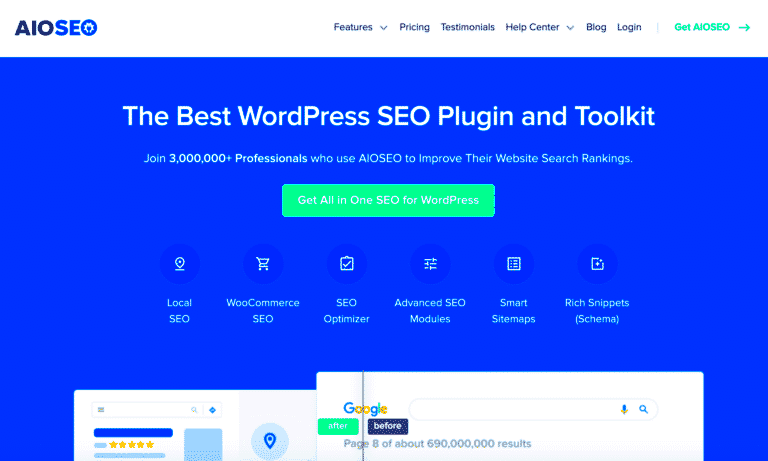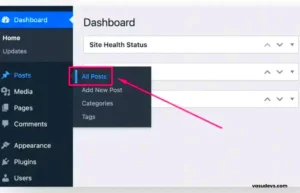When it comes to optimizing your WordPress site, SEO plugins are your best friends. They serve as powerful tools that simplify the often complex process of search engine optimization. By installing an SEO plugin, you can effortlessly improve your site’s visibility on search engines like Google, making it easier for potential visitors to discover your content. Whether you’re running a blog, an online store, or a corporate website, an SEO plugin can help you craft a well-optimized online presence. In this section, we’ll explore what SEO plugins are and why they are essential for your WordPress site.
Understanding the Importance of SEO for WordPress

SEO, or Search Engine Optimization, is crucial for any website, and WordPress isn’t an exception. You might be wondering, “Why does this even matter?” Well, let’s break it down:
- Increased Visibility: A well-optimized site improves your chances of ranking higher in search engine results, meaning more eyeballs on your content.
- Better User Experience: Good SEO practices often lead to a more organized and easier-to-use website for visitors.
- Higher Traffic: When your website ranks well for relevant keywords, you can attract more organic traffic, which is often more valuable than paid ads.
- Increased Credibility: Sites that rank higher are often perceived as more credible and trustworthy by users.
- Better Conversion Rates: Higher visibility and traffic can lead to increased conversions, whether that’s sales, sign-ups, or engagement.
Moreover, with WordPress powering over 40% of the web, having the right SEO strategy ensures that you’re not just a needle in a haystack. A robust SEO approach can make all the difference in how your content gets noticed. By leveraging the benefits of SEO on WordPress, you’re setting up your website for success.
Key Features to Look for in an SEO Plugin

Choosing the perfect SEO plugin for your WordPress site can feel overwhelming, but focusing on key features can simplify your decision. Here’s what you should look for:
- On-Page Optimization: A solid SEO plugin should help you optimize individual pages and posts. Look for features like keyword analysis, content suggestions, and readability scores to ensure your content is engaging and search-friendly.
- XML Sitemap Generation: An XML sitemap helps search engines index your site more effectively. Make sure your plugin can automatically generate and update a sitemap whenever you add new content.
- Meta Tag Management: The ability to customize meta titles and descriptions is crucial for improving how your pages appear in search results. A good plugin will allow you to easily manage these tags across your site.
- Social Media Integration: Properly optimizing your content for social media can boost engagement. Look for plugins that enable Open Graph tags and Twitter Cards for better visibility on social platforms.
- Analytics and Reporting: Having access to SEO performance metrics is key to adjusting your strategy. Choose a plugin that integrates with Google Analytics or provides its own reporting tools.
- WooCommerce Compatibility: If you run an online store, ensure that your SEO plugin is compatible with WooCommerce, allowing for optimized product pages and improved search visibility.
By keeping these features in mind, you’ll be in a better position to select an SEO plugin that meets your needs and helps improve your site’s performance in search engines.
Popular SEO Plugins for WordPress
With numerous SEO plugins available for WordPress, it can be hard to know where to start. Here’s a rundown of some of the most popular options:
| Plugin Name | Key Features | Best For |
|---|---|---|
| Yoast SEO | On-page analysis, readability assessment, XML sitemaps, social media integration | Beginners and advanced users looking for comprehensive tools |
| All in One SEO Pack | XML sitemaps, social media integration, advanced WooCommerce support | Users seeking a straightforward setup |
| SEOPress | Meta tags, Google Analytics support, content analysis | Users who want a budget-friendly option without sacrificing features |
| Rank Math | Advanced SEO analytics, on-page optimization, built-in schema support | Users looking for a feature-rich, intuitive interface |
| WP Meta SEO | Bulk meta management, image SEO, Google Analytics integration | Site owners with lots of content needing organized management |
These plugins are well-known in the WordPress community and come with various features tailored to different needs. Whether you’re just starting or are a seasoned pro, you’re bound to find a plugin that suits your specific requirements.
Comparing the Top SEO Plugins
When it comes to optimizing your WordPress site for search engines, choosing the right SEO plugin can feel overwhelming. But don’t stress! Let’s break down some of the top contenders in the market to see which one might be the right fit for your needs.
Here’s a quick comparison of three popular SEO plugins:
| Plugin | Key Features | User-Friendliness | Pricing |
|---|---|---|---|
| Yoast SEO |
|
Very user-friendly, ideal for beginners | Free; Premium version available starting at $99/year |
| All in One SEO Pack |
|
Intuitive but may require a slight learning curve | Free; Pro version available, around $49/year |
| Rank Math |
|
Quite user-friendly, innovative setup wizard | Free with premium options starting at $59/year |
Each of these plugins brings something unique to the table. So, consider what’s essential for your site. Are you more focused on real-time analysis? Or perhaps detailed reports on keyword ranking? Take your time to evaluate features that align with your SEO strategy!
How to Set Up an SEO Plugin for Your WordPress Site
So, you’ve chosen your SEO plugin—great! Now, let’s walk through the setup process so you can hit the ground running and optimize your WordPress site effectively.
- Install the Plugin:
Go to your WordPress dashboard, navigate to “Plugins,” and click “Add New.” Search for your chosen SEO plugin, then click “Install Now” followed by “Activate.” Simple!
- Configure Initial Settings:
Once activated, look for a new menu item specifically for the plugin on your dashboard. Most plugins will guide you through an initial setup wizard to customize basic settings. Pay careful attention to options regarding site visibility and search engine indexing.
- Set Up Titles and Meta Descriptions:
For each page and post, you can often customize the title and meta description. These elements are crucial for SEO, so make them clear and include relevant keywords.
- Generate XML Sitemap:
This feature makes it easier for search engines to crawl your site. Look for the XML sitemap option in your plugin settings and activate it. Don’t forget to submit your sitemap to Google Search Console!
- Utilize Content Optimization Features:
Many plugins offer content analysis tools. As you write posts, pay attention to suggestions for improving SEO, like keyword density and readability scores. It’s like having a personal SEO coach!
With these steps completed, you’ll be well on your way to optimizing your site for better search engine visibility. And remember, SEO is an ongoing effort, so keep experimenting and learning along the way!
Common Mistakes to Avoid When Using SEO Plugins
Choosing an SEO plugin for your WordPress site is a step in the right direction, but there are some pitfalls you can stumble into if you’re not careful. Let’s dive into the common mistakes that people often make when using SEO plugins, so you can steer clear of them and make the most of your SEO efforts.
- Ignoring Plugin Documentation: Many users dive in headfirst without reading the documentation provided by the plugin developers. This often leads to misunderstanding features or not using them to their full potential. Be sure to read through the guides to truly harness the capabilities of your plugin.
- Overloading with Multiple Plugins: Using multiple SEO plugins can create conflicts and confuse search engines. Stick to one primary SEO plugin and disable or uninstall others. This helps ensure clarity and cohesion in your SEO strategy.
- Neglecting Regular Updates: SEO is a dynamic field, and plugins are frequently updated to keep up with the latest algorithms. Failing to keep your plugin updated can result in missed features or, worse, vulnerabilities. Always check for updates and apply them timely.
- Forgetting About Overall Site Optimization: Relying solely on your SEO plugin won’t cut it. Your content quality, site speed, and overall user experience significantly impact your SEO. Use the plugin’s recommendations as part of a broader SEO strategy.
- Ignoring Analytics: Many plugins come with built-in analytics. It’s vital to monitor this data regularly. Ignoring it can leave you in the dark about what’s working and what isn’t, making it harder to refine your SEO efforts.
By avoiding these common mistakes, you can ensure that your SEO plugin works effectively and that you achieve better visibility in search engines.
Conclusion: Making the Right Choice for Your Website
As you wrap your head around the wealth of SEO plugins available for WordPress, remember that choosing the right one is crucial for the success of your site. The right plugin can pave the way for improved search engine rankings, increased traffic, and enhanced user experience.
Here are some key takeaways to consider before making a decision:
- Understand Your Needs: Before choosing, assess what you need from an SEO plugin. Do you require advanced features, or are you just looking for something basic? This understanding will help narrow your options.
- Prioritize Usability: An intuitive interface can save you hours of frustration. Look for plugins that offer straightforward navigation, easy setup, and comprehensive support.
- Examine Compatibility: Ensure the SEO plugin you choose is compatible with your theme and other plugins. This can help prevent technical issues down the line.
- Look for Customization Options: A good SEO plugin should allow you to customize settings based on your unique needs and preferences. Flexibility can make a significant difference in utilizing its full potential.
- Read Reviews and Seek Recommendations: Tap into the experience of others. Look for reviews and testimonials to gauge real user experiences with specific plugins.
By following these guidelines and avoiding common mistakes, you’ll be well-equipped to choose an SEO plugin that enhances your online presence and meets the specific needs of your website. Happy optimizing!



